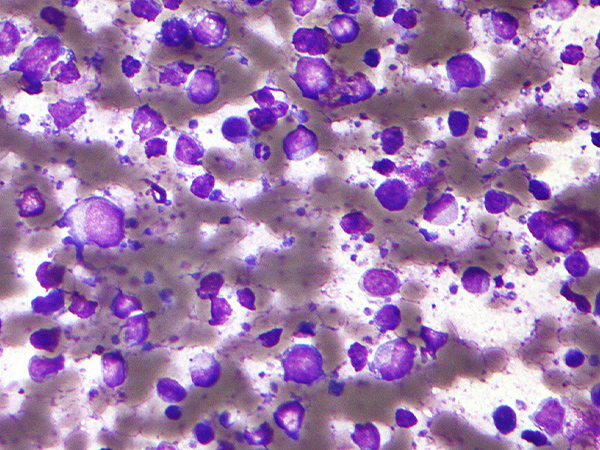Treating an Aggressive Type of Non-Hodgkin Lymphoma
The FDA has approved a new immunotherapeutic for treating certain adult patients with diffuse large B-cell lymphoma.

The U.S. Food and Drug Administration (FDA) granted accelerated approval to a new targeted immunotherapeutic called tafasitamab-cxix (Monjuvi) for use in combination with the immunomodulatory agent lenalidomide (Revlimid) to treat certain adult patients with diffuse large B-cell lymphoma (DLBCL).
This new combination treatment is for adult patients with relapsed or treatment-resistant disease who are not eligible for a stem cell transplant and need additional options.
DLBCL is an aggressive cancer and the most common form of non-Hodgkin lymphoma, which is cancer that affects certain white blood cells in the body’s immune system. As noted in its name, diffuse large B-cell lymphoma develops in B cells and often starts with a fast-growing mass in a lymph node under the arm or in the neck or chest area. This cancer can also develop in other parts of the body, such as the intestines, bones, brain, or spinal cord.
Tafasitamab-cxix is among a growing number of immunotherapeutics designed to target B cell cancers. In the trial that led to the FDA’s approval, it was given intravenously with lenalidomide, a drug that modulates the immune response and has been used to treat patients with other blood cancers.
The efficacy of the combination of the two drugs was evaluated among 81 patients in an open label, multicenter, single-arm trial. Among patients with confirmed DCBCL, 37 percent had a complete response and 18 percent had a partial response. The average duration of response was 21.7 months.
According to federal statistics, in 2020 there will be more than 77,000 new cases of non-Hodgkin lymphoma diagnosed in the U.S. Diffuse large B-cell lymphoma accounts for about 30 percent of them. The five-year survival rate for DLBCL stands at nearly 64 percent.
The indication of this new drug combination was granted an accelerated approval on July 31, 2020. Accelerated approval means continued approval may be contingent upon a confirmatory trial.
